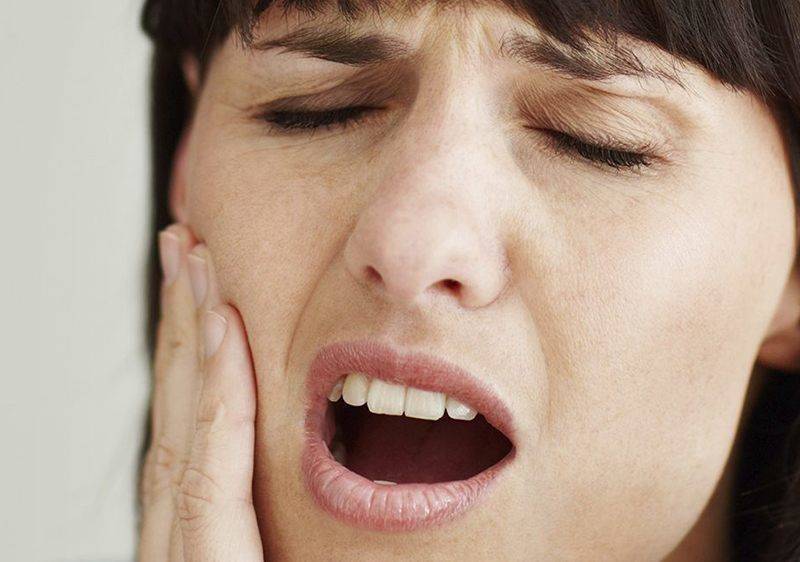If your jaw often feels painful, locks or clicks when you eat, you might have a temporomandibular joint disorder (TMJD).
This is a common dental problem that is estimated to affect around 30 percent of adults at some stage in their lives. TMJD can have a number of causes and affects people of all ages.
If you think you might have a temporomandibular joint disorder, you should visit your doctor or dentist for a full examination and discuss the TMJD treatment options that are most suitable for you.
What is the temporomandibular joint?
The temporomandibular joints (TMJ) are two joints at the back of the lower jaw that connect it to the upper jaw and the skull. They are located in front of each ear.
This joint acts as a 'hinge' that allows your jaw to move when you eat, speak and perform other facial movements. The temporomandibular joint is a complex structure of hard and soft tissues that allow the jaw to move in multiple directions.
When something happens to prevent this joint from working properly, you may find it difficult or painful to move your jaw. You could also experience pain and discomfort in other areas, such as your ears or head. TMJD is also sometimes called TMJ dysfunction.
What causes temporomandibular joint disorders?
There is no single cause for TMJD, but in many cases the joint has been misaligned and prevented from functioning correctly.
Some of the most common TMJD causes are:
- teeth grinding and jaw clenching (bruxism), often related to stress
- an uneven bite, which may be due to damaged or worn teeth or new fillings, crowns or dentures
- injury or other trauma to the jaw
- osteoarthritis and other degenerative joint conditions
- diseases such as fibromyalgia, gout or rheumatoid arthritis
However, in some cases there may be no obvious cause.

What are the symptoms of TMJD?
The signs and symptoms of temporomandibular joint disorders can be as varied as the causes, but you may experience one or more of the following symptoms:
- clicking, popping or grating sounds when you move your jaw
- difficulty opening and closing your mouth or a 'locking' jaw
- pain or discomfort in your jaw muscles, especially when you eat or yawn
- pain in front of your ears, which may spread to your face, head, neck or upper back
- headache or earache
- pressure behind your eyes or inside your ears
- a change in your bite.
Some TMJD symptoms can be signs of different or additional problems, so it is important that you visit your dentist or doctor for a full evaluation.
Treatments
In many cases, TMJD is a short-term problem that will go away by itself within a few months, but some cases can also be long-term. Either way, your dentist will recommend treatment options that can help relieve any pain and discomfort.
These treatments may include:
Lifestyle changes
You can sometimes ease strain on your joints and ease your symptoms by:
- avoiding hard and chewy foods, including chewing gum
- cutting food into smaller portions
- avoiding opening your jaw wide or clenching
- applying a warm or cold compress to your jaw several times a day
- massaging or gently stretching your jaw muscles.
If your TMJD is related to stress, your dentist may recommend relaxation techniques or refer you to your doctor.
How can my Bupa dentist help?
When you visit your local clinic, we’ll ask you to describe your symptoms and then carry out a comprehensive physical examination of your mouth and jaw. Because TMJD can be related to other health problems or aspects of your lifestyle, you’ll need to give us a detailed medical and social history.
If necessary, your dentist will request x-rays and a CT or MRI scan to examine your jaw and joints in detail.
Your dentist will then discuss the most suitable TMJD treatments for you, based on your individual circumstances and the likely cause of your condition.

Mouthguards
If your TMJD is related to teeth grinding or jaw clenching (a condition known as bruxism), your dentist may recommend that you wear a mouthguard at night. Also known as a splint or bite plane, this appliance is custom-made to fit your mouth and stops your teeth from grinding together.
Wearing a mouthguard can ease the symptoms of bruxism, but it doesn't treat the cause. If you grind and clench your teeth because of stress, your dentist will recommend that you find ways to reduce stress in your life.
Learn more about bruxism mouthguards.
Dental treatments for TMJD
If your TMJD is caused by an uneven bite, your dentist will recommend treatments that will help your teeth to fit together correctly.
This may involve reducing oversized fillings or crowns or building up short or damaged teeth. If you have an overbite or underbite, your dentist may recommend orthodontic treatment to bring your jaws properly in line.
Medication
There is no known medication that can cure TMJD, but there are options that can ease pain and discomfort. Depending on your symptoms and your circumstances, your dentist may recommend painkillers, anti-inflammatory drugs or muscle relaxants. You should ensure that you inform your dentist if you’re taking other medications or if you have a history of allergies. This will help them prescribe the safest medication for you.
If your TMJD is caused by a condition such as arthritis, you may be referred to a specialist for ongoing care. Sometimes steroid injections can help.
Joint surgery
Most people recover from TMJD without the need for surgery, but this may be recommended if you have a more severe or long-lasting case. Surgical procedures are performed by an oral and maxillofacial surgeon. Your surgeon will discuss the different treatment options available so that you can make an informed decision.
Treatments
1 You can receive 100% back on dental check-up and cleans (select dental items only) once every 6 months at Members First Ultimate Providers. Waiting periods, service restrictions (clinical reasonability rules), policy and fund rules apply. Excludes orthodontics and in-hospital treatments. Available on all eligible extras products which includes General Dental (excluding FLEXtras and Your Choice Extras 60 where General Dental is not included). If you choose or require any additional dental services, any health insurance benefits will also be subject to your yearly limits.
2 You can receive 100% back on direct restorations or fillings (select dental items only), up to yearly limits, at Members First Ultimate Providers. Waiting periods, service restrictions (clinical reasonability rules), policy and fund rules apply. Benefits are payable up to yearly limits or on available remaining limits in relation to your product. Some out of pocket costs may apply if a claim exceeds your yearly limits. Excludes orthodontics and in-hospital treatments. Available on all eligible extras products which includes General Dental (excluding Simple Start – Basic Plus, OSHC Extras, FLEXtras and Your Choice Extras 60 where General Dental is not included). If you choose or require any additional dental services, an out-of-pocket cost may apply.
3 Members First Ultimate Providers are not available in all areas.
ø Any surgical or invasive procedure carries risks. Before proceeding, you should seek a second opinion from an appropriately qualified health practitioner.